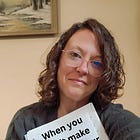Give yourself permission to fail
Sometimes failure isn't the pathway to success. Sometimes failure is just failure, and that's okay.

Maybe permission to fail isn’t so much about fluctuating between the canyons and summits. Instead, it’s a gentle relinquishing of needing certitude, solutions, answers. It’s learning that both hanging on and letting go can be achieved when we yield to the process of living. Which means entering into the unknowns and question marks without desperately searching for what cannot be known or resolved right now, today.
For the audio version of this essay, please click here:
I hate failure. I hate my flaws. I hate making mistakes.
I’m a perfectionist. I don’t know when it began, but somewhere in childhood I believed I could attain perfection if only I worked harder, or maybe longer, than most people. I always knew I had a broken heart, but I didn’t allow it a portal through which it could be visible to others. In turn, I overcompensated for what I perceived as weakness by pleasing, perfecting, and performing.
Sometimes I ruminate on all that’s gone wrong in my adult life, which is to say, all that has not fallen into place according to my idyllic plans. This is the primary source of my constant disappointment—that I didn’t retain the job related to my graduate degree, didn’t have the children without disabilities and genetic conditions and psychological diagnoses, didn’t have the family support in raising those kids, didn’t have the resources for annual family vacations.
This deprivation mindset might be why it’s so easy for me to latch on to obsessive, controlling behaviors when everything seems to be crumbling: the fictional mansions in my mind I built for myself, the sanitized version of my childhood, the glamorized impression of what success looks like for me as an author.
When I tell myself I’m not reaching the numbers of people I once hoped I would, I am sticking my head down an empty well, desperate for a trickle of water to revive my parched spirits. It’s not a healthy frame of mind, but I’m not inclined for sunshine-y reframes. Instead, I’ve had to train myself to shift my vantage point.
Life is not lived in either the full or empty glasses, but we inhabit both spaces, which can often feel intolerable.
Just like failing. The word itself signifies a finale, a door closing, a flattened reputation. It means what I’ve achieved might amount to nothing. It implies rejection, even condemnation.
But what amount of recrimination have I assigned to myself?
Maybe you’ve heard plenty of platitudes about failure, as I have. Some might include:
“Success is not final, failure is not fatal: it is the courage to continue that counts.” —Winston Churchill
“I have not failed. I’ve just found 10,000 ways that won’t work.” —Thomas Edison
“Failure is success in progress.” —Albert Einstein
“Our greatest glory is not in never failing, but in rising every time we fall.” —Confucius
“Failure is simply the opportunity to begin again, this time more intelligently.” —Henry Ford
“Those who dare to fail miserably can achieve greatly.” —John F. Kennedy
“Courage allows the successful woman to fail and learn powerful lessons from the failure. So that in the end, she didn’t fail at all.” —Maya Angelou
Do these work as motivation when your heart is weary from trying again and again, from standing up every time you fall to the ground, from picking up the pieces after every setback? Sometimes they don’t. They fall flat. When inspirational quotes neglect to move me, I think of another possibility: there is only so much I can do. My mind and heart, when filled to capacity, might need to rest—even revel—in its current loss.
Grief sets in. For me, this involves wallowing for a few hours, maybe a day. I allow myself that without forcing myself to cheer up or snap out of it. I think, It’s just for today, and tomorrow I will wake up and try to find a new perspective.
The human heart can only give and receive love when it breaks open. We love from our wounds. When exposed and shared with others, our brokenness can repair and restore our inherent gifts and talents.
Maybe the wounds in themselves are the gift.
Some days, it’s all I have: the remnants and fractured pieces of myself. My nothingness, my emptiness, my flaws and mistakes and setbacks and imperfections—these remain my only offerings. And if I tell myself that’s good enough for today, I can be still in the reality that I am human. I am finite.
Sometimes I forget who I am, and this contributes to my inability to allow myself to fail. Twenty years ago, I thought I had my life figured out: my purpose, the skills I’d acquired and supposed inherent talents I possessed. I thought I knew exactly how to accomplish the lofty goals I set for myself.
But failure happened suddenly, then frequently. I went from being the top student in high school and college—winning art and poetry contests—to losing a job I’d sworn was my destiny.
I’ve long since abandoned everything I thought I knew from the last twenty years, because it’s all changed. It’s all different than what I expected or planned.
Sarah’s birth was the first event that taught me I knew very little about what “should” happen to a person, that what I cannot control or predict far outweighs what I can. So I’ve vacillated between control and surrender since then.
In hard times, people tell you to do both: “Just hang on,” they say, “things will get better.” The same people might later tell you, “You gotta let it go. Move on.”
What is it, then? Do we hang on or let go?
Maybe permission to fail isn’t so much about fluctuating between the canyons and summits. Instead, it’s a gentle relinquishing of needing certitude, solutions, answers. It’s learning that both hanging on and letting go can be achieved when we yield to the process of living. Which means entering into the unknowns and question marks without desperately searching for what cannot be known or resolved right now, today.
If you’d like to support my work but can’t commit to a monthly or annual subscription, you can make a one-time donation as a tip here.
If this essay resonated with you, please consider sharing it, restacking it, and becoming a subscriber. Here are some other articles I wrote that relate to today’s topic:
The Book Club for Busy Readers
I’m pleased to announce that I’ll be hosting a monthly virtual book club for all of my Substack subscribers, starting in January. Generally, these will be held on the second Sunday of every month (unless otherwise noted) from 2-3:30 PM Eastern via Zoom. In two cases, I have authors who will make a guest appearance to discuss their book with us. If you are interested in joining, I will need you to send an email (jeannie [dot] ewing 07 [at] gmail [dot] com—without spaces), so that I can extend the Zoom invitation month to month.
Click here for more information:








I’ve always been a perfectionist, too. I hide my massive pile of failures underneath my tiny, thin veneer of things I did right. I love reading the failure quotes. For some reason, those I so easily forget. Only one person gets to stand on the podium at a time and wear a gold medal. Why so many of us think we’re all supposed to be there, I don’t understand. Thank you for this beautiful reminder that life is filled with failures, if we’re doing something.
Oh how I can relate to this post! Perfectionism was valued in my family and that is what the adults expected from me since Kindergarden. They had high expectations of me going to college on a scholarship. I did succeed in getting one at a college that was not a fit for me. I hated it and dropped out. I started pressing shirts in a drycleaners and my life took a totally different path. Sometimes, when I'm feeling bad about myself, I think I failed by not doing things the conventional way. I got married too young and my marriage was fraught with discord. It affected my children and I feel I failed them because of that. I can be very hard on myself. But then I think about how far I've come, and I have to tell my inner critic to shut up and have more self compassion.